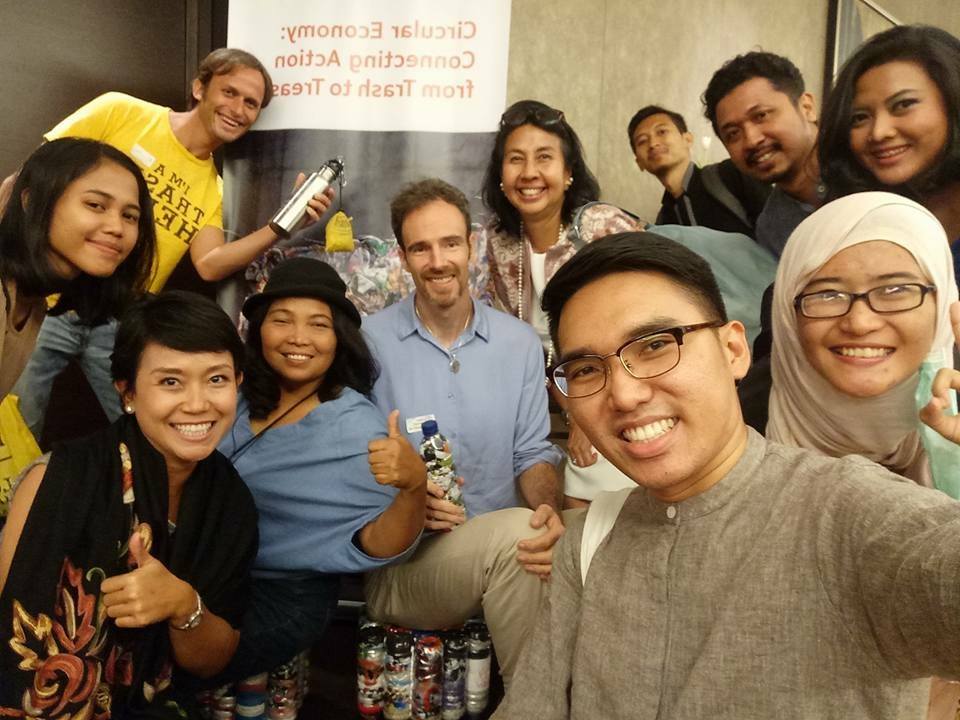23/24 November 2016 – Trash Hero Indonesia
Roman Peter just participated in the Trash to Treasure Seminar in Jakarta, Indonesia. Organized by the Ministry of Infrastructure and the Environment (The Netherlands) in collaboration with the Ministry of Environment and Forestry, the Republic of Indonesia, and the Indonesian Waste Platform, the focus of this seminar was to discuss possibilities for reducing the influx of waste to our environment, explore solutions on reduction of single-use packaging and alternative packing materials, and to establish partnerships on reaching these goals.
Waste is a global problem: The current scale of contamination of the marine environment by plastic and synthetic debris is vast and poses a serious threat to our environment, health and wildlife. With an expected world population growth of 9.7 billion people by 2050 and ever increasing levels of consumption, the need for addressing waste, litter and marine debris is becoming more and more urgent. Tackling the complex issue of waste management and the Marine Debris problem in Indonesia is challenge for all involved: Indonesia is the largest archipelago in the world, located in the tropics and the equator is traversed by extensive sea. The sea area of Indonesia covers over 70% of the entire territory of Indonesia and has as many as 17,504 islands.
Most participants agreed that to establish an (economically) efficient system for reducing waste, all stakeholders should be included in future strategies. There should be a holistic approach. For example: decision makers should be informed and educated about recycling strategies and there should be a strong and determined political will to act. Businesses should be offered incentives to recycle and produce ‘green’ products and the entire public must be educated on how to participate in recycling and waste reduction. NGO’s involved in recycling and waste reduction should be encourage and supported. Many suggestions were made on how to improve the recycling system in Indonesia. All agreed that the current recycling system in Indonesia is lacking. Recycling 3 centres, equipment and technology need to be improved and they need to be made more widely available. It was suggested to start by having recycling centres in all major cities in the country but that in general all districts and sub-districts should be included in a general plan if the aim is maximum waste reduction and recycling.
A big part of discussion was education. All agreed that education plays a pivotal role in the reduction of waste. All members of society should be educated, not only children in school. For example, government officials need to be informed about recycling strategies and waste management in general if they want to create an efficient waste management plan and policies concerning waste. Within formal education a campaign should be started that includes ALL schools. This campaign should focus on the impacts of waste, specifically the impact of waste on health and hygiene. Teachers should also be trained since their behaviour influences their pupils. Within port settings fishermen, port workers and management should be educated on waste. To educate people in general the media and large-scale events can be mobilised because of their educational value. The power of media on public opinion should be harnessed in the mission to change people’s way of thinking about waste. Educational programs on waste for television can be created and producers can be supported/subsidised by the government. Media should be encouraged to report on waste issues. The importance of the role of businesses in reducing waste was also discussed and all agreed that future policy and enforcement needs to be formulated and increased. Some more ideas and suggestions: There should be incentives in place for businesses that engage in recycling and production using recycled materials. Going green should be profitable. There should be policy on the waste-management of businesses, etc. In general, producers should be held accountable for their actions concerning the environment. There should be strict policies and enforcement which are focused on the move towards a blue\circular economy: Energy should not be subsidised but optimised, production needs to become cleaner, remaining waste needs to be recycled, etc. All agreed that it was necessary to start establishing real action plans to deal with the influx of waste in Indonesia. For the health of its citizens, the environment and the economy (creation of jobs, tourism, etc).


Join the conversation